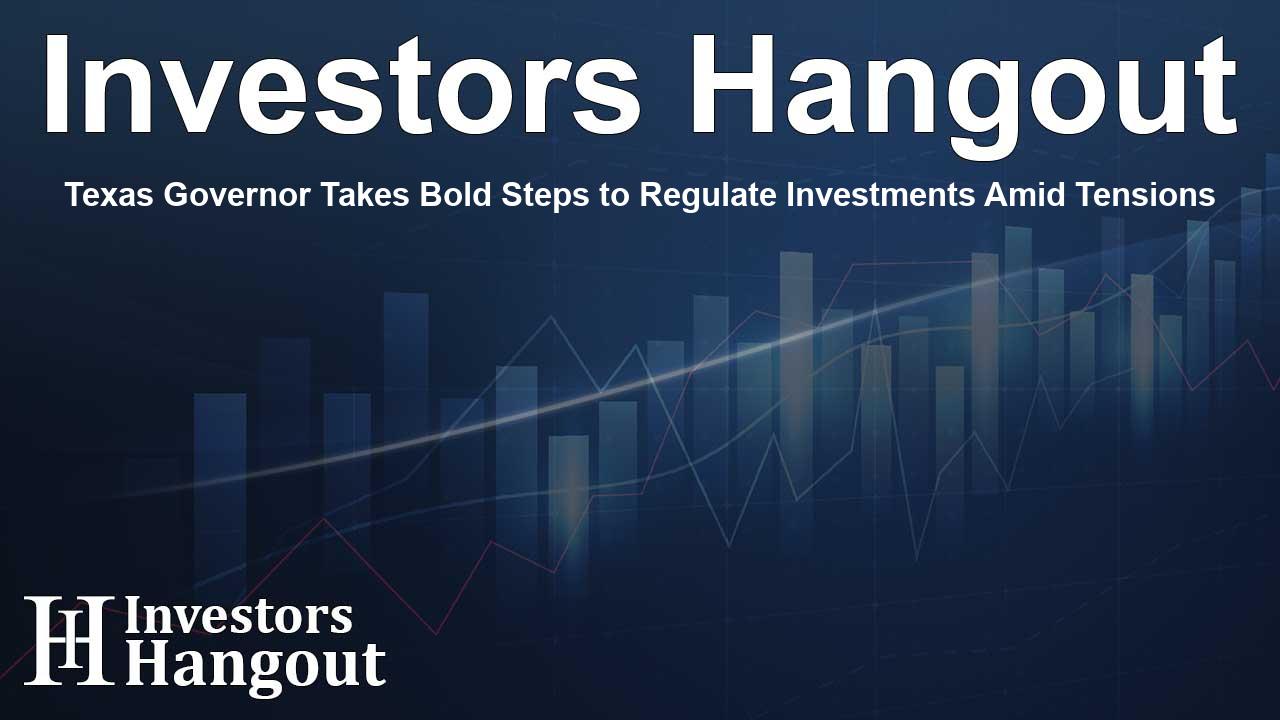Texas Governor Takes Bold Steps to Regulate Investments Amid Tensions

Texas Governor Directs State Agencies on Investment Policies
Texas Governor Greg Abbott has taken significant steps to change the investment landscape for state agencies. He has issued a directive urging these agencies to discontinue investments in China and to divest from any existing Chinese assets. This directive, articulated in a recent letter, emphasizes the perceived security and financial threats associated with investments in China.
Understanding the Directive
The directive from Abbott highlights his concerns regarding the increasing financial risks that may arise due to growing tensions between the U.S. and China. In his letter, the governor explicitly prohibits Texas investment entities from making new commitments to Chinese markets. Furthermore, he has called for these entities to divest from current Chinese investments as soon as it is practical to do so.
The Motivation Behind the Directive
Abbott's strong stance is rooted in the belief that Texas must protect itself and its financial resources from potential threats, particularly those that may stem from actions taken by the Chinese Communist Party (CCP). His assertions raise questions about the sustainability of foreign investments and their impact on local economies.
The Broader Context of U.S.-China Relations
These developments occur in a climate of rising tensions between the United States and China. Recently, significant legislative action has taken place in the U.S. House of Representatives, including the advancement of two Republican bills aimed at reintroducing the Justice Department's "China Initiative." This initiative is designed to combat espionage and protect U.S. interests in intellectual property and education.
Political Reactions and Economic Implications
Political figures, including President-elect Donald Trump, are advocating for even more stringent measures, such as imposing a hefty 60% tariff on Chinese goods. Meanwhile, Chinese President Xi Jinping has expressed a willingness to collaborate with the U.S. on managing bilateral relations, indicating a desire for productive dialogue despite the ongoing tensions.
Market Reactions to these Policies
The investment environment focused on China has already begun to shift, as various exchange-traded funds (ETFs) that provide exposure to Chinese markets have witnessed declines. As of a recent date, notable ETFs such as the KWEB (KraneShares CSI China Internet ETF) have seen a drop of nearly 6%, while the FXI (iShares China Large-Cap ETF) fell by over 5%. Similar patterns are evident in the PGJ (Invesco Golden Dragon China ETF) and the MCHI (iShares MSCI China ETF) as well.
The Future of Investments and International Relations
With these new directives in effect, state agencies and investors alike will need to navigate an increasingly complex global investment landscape. Understanding the potential consequences of current geopolitical tensions will be crucial for making informed decisions in the coming months. As conversations about national security and financial risks continue to evolve, the impact on investment strategies will likely be significant.
Frequently Asked Questions
What is Texas Governor Greg Abbott's main directive regarding investments?
Governor Greg Abbott has directed state agencies to divest from current investments in China and to avoid making any new investments there due to security and financial concerns.
Why is the directive significant?
The directive reflects broader concerns about the risks involved in foreign investments, specifically in light of escalating tensions between the U.S. and China, and aims to protect Texas's financial interests.
What recent political actions support this directive?
The directive aligns with recent legislative moves by the U.S. House, which has advanced bills to combat espionage and safeguard U.S. intellectual property further highlighting bipartisan concerns about China.
Which stocks or ETFs are affected by these developments?
ETFs such as the KWEB, FXI, and MCHI have all experienced declines in recent weeks due to the broader market reactions to changes in U.S.-China relations.
How might this directive influence future investments?
Investors may need to reassess their portfolios and strategies when considering investments related to China, as increasing regulatory pressures and market volatility could pose significant risks.
About Investors Hangout
Investors Hangout is a leading online stock forum for financial discussion and learning, offering a wide range of free tools and resources. It draws in traders of all levels, who exchange market knowledge, investigate trading tactics, and keep an eye on industry developments in real time. Featuring financial articles, stock message boards, quotes, charts, company profiles, and live news updates. Through cooperative learning and a wealth of informational resources, it helps users from novices creating their first portfolios to experts honing their techniques. Join Investors Hangout today: https://investorshangout.com/
Disclaimer: The content of this article is solely for general informational purposes only; it does not represent legal, financial, or investment advice. Investors Hangout does not offer financial advice; the author is not a licensed financial advisor. Consult a qualified advisor before making any financial or investment decisions based on this article. The author's interpretation of publicly available data shapes the opinions presented here; as a result, they should not be taken as advice to purchase, sell, or hold any securities mentioned or any other investments. The author does not guarantee the accuracy, completeness, or timeliness of any material, providing it "as is." Information and market conditions may change; past performance is not indicative of future outcomes. If any of the material offered here is inaccurate, please contact us for corrections.